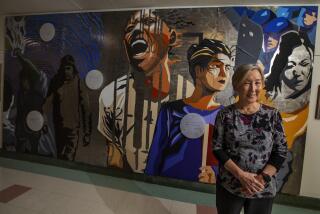Americas Institute a Study in Success
- Share via
LA JOLLA — In a field cluttered with think tanks, scholarly programs and business groups, the Institute of the Americas was to be something different. Its unique role was to bring together a broad array of experts and concerned citizens who would foster “communication, understanding and cooperation among the peoples and nations of the Western Hemisphere.”
One year after its founding on Nov. 19, 1984, the Institute of the Americas is very much a reality, apparently thriving from its base on the campus of UC San Diego. On Tuesday, the institute completed a workshop on biotechnology in Latin America and its possible application to agriculture, health and nutrition. Next on the agenda: a conference on the debt crisis in Latin America.
“It was always a risk in the beginning, judging how many people would be interested in what we were doing,” recalled Dr. Joseph Grunwald, the institute’s president and former deputy assistant secretary for economic policy in the Bureau of Inter-American Affairs at the U.S. Department of State. “But the response has been very positive. People are very hungry to learn about inter-American affairs.”
In the past year, the institute has hosted seminars, discussions, workshops and presentations on topics ranging from U.S.-Latin American relations to a Soviet view of Latin America. In recent weeks, the center has presented such diverse events as an evening of Peruvian music and a talk by Arturo Cruz, the Nicaraguan opposition leader. The institute will also sponsor an appearance by a representative of Nicaragua’s Sandinista government, Grunwald said.
Although nonpartisan, the institute does endorse democracy. But officials say that no reasonable point of view, including Marxist interpretation, has been excluded from the institute’s agenda. Overall, they add, the response has been very upbeat--though hecklers did jeer the anti-Sandinista remarks by Cruz.
“The institute has been very positive,” said Donald Wyman, acting director of the Center for U.S.-Mexico Studies at UCSD. The institute’s concerns, Wyman said, provide a fitting complement for university research.
Grunwald, a former senior fellow at the Brookings Institution in Washington, D.C., talks at length about bringing together people from different fields and making information available in “non-technical” language. He says he seeks to avoid isolation in the “ivory towers” of academia, business or government.
The institute was the brainchild of Theodore Gildred, a wealthy San Diego businessman with a longtime interest in Mexico. It was intended in part as a West Coast version of the many inter-American study groups based in New York and Washington.
The nonprofit, autonomous institute was founded with a $6-million grant from the Gildred Foundation, of which Theodore Gildred is chairman. The original grant and other donations provide operating expenses--including salaries of the 10-member staff--and also financed construction of the institute’s elegant $1.5- million building on the UCSD campus.
Asked about future topics for examination, institute officials point to many possibilities: the continuing economic crisis in Latin America, the growing move toward democracy in the region, and the increasing interdependence between the United States and Latin America.
More to Read
Sign up for Essential California
The most important California stories and recommendations in your inbox every morning.
You may occasionally receive promotional content from the Los Angeles Times.













